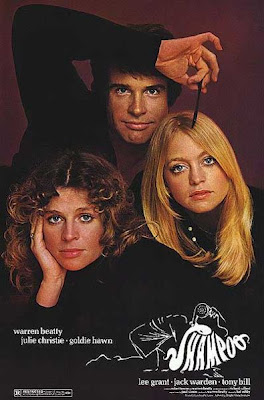
SHAMPOO
US, 1975, 110 minutes, Colour.
Warren Beatty, Julie Christie, Goldie Hawn, Lee Grant, Jack Warden, Carrie Fisher.
Directed by Hal Ashby.
Shampoo is a very American kind of film. Publicity and the critics boosted the film's success. Lee Grant won an Oscar for her performance as best supporting actress. Many, however, found the film very uninvolving, although so many intentions seemed promising. The premises: decaying American society in a hurry on Nixon- Agnew election-eve day, a non-hero product of this society who awakes, but to disillusion. Satire seems always imminent, but could be more telling; or else it is very telling to Americans, with its gloved swipes at the permissive society and its oblique lampooning of contemporary moralising, double-talking politicians. Goldie Hawn, Lee Grant and Jack Warden are excellent, Julie Christie fine, but Warren Beatty not so engaging. Shampoo has a lot of potential for satire on the American situations of the sixties and early seventies.
1. The main impact of this film? Its genre; comedy, drama?
2. Its impact on American audiences? Impact on non-American audiences? How much difference?
3. The focus of the title? The 'Shampoo' world as a microcosm of America? The atmosphere of Los Angeles, the Beverley Hills hairdresser? The world of California? California and the United States?
4. The importance of the time, November 4th, 1968? The atmosphere of the times, the rushing about, people saying that everything was great, the concentration on self-interest? The social, political, moral aspects of the times? Nixon and Agnew and their campaign, their election and the people who elected them, the motivation of the electors, the visualizing of the results, the interviews, the audience's knowledge of the later irony? How well was this background integrated into the film? As a setting for the film?
5. How much of a hero for the film was George? A non-hero? The detailed style of his way of life, the values that he worked by? How did he change during the film? How hard a character, how soft? How was George meant to be the typical young American of the time? His past, present, future?
6. The atmosphere of the opening: the relationship with Felicia, George leaving her for Jill? The sexuality emphasis of the opening and the film itself? A metaphor of relating and non-relating? George's attitude, enjoyment? His later explanation of himself and his attitudes to Jill? What did this all say about American society?
7. The portrayal of George and his ambition? Seeing him at work in the shop, not finishing, rushing around, the phone, the chatter to the women, their relationship to him? His wanting money? His wanting to start on his own? The importance of the bank sequence and his dialogue with the manager? His anger? The relationship with Lester, his bowing to Lester for the money? George and his ambition, always in a hurry, moving but going nowhere? His always saying 'Great'? Jill's telling him to grow up? His final stopping?
8. The portrayal of women in the film? Their status in Californian society? Aura of sexuality? George's comments on his experience at the hairdresser's? The comment on men and women? The comment on affairs, liaisons, marriage? The casual values of American society as mirrored in the hairdresser's?
9. What type of girl was Jill? How sincere and searching, how much of a cliched American? The quality of her relationship with George? Her naivety in believing he loved her? Her work, relationship with Johnny? The reasons for her disillusionment? The final clash with George, her awareness of herself and her future, her understanding of George?
10. The friendship of Jill and Jackie? Jackie and her past relationship with George? Her portrayal as the spoilt mistress of Lester? The way she acted with George, with Lester? The sequence of her hair being done for the party? Her party behaviour, her outrageous conversation? The affair in the greenhouse? Her awareness of the truth? The nature of her choice? Her self-interest, her love for Lester? The pathos for George?
11. The contrast with Felicia? The rough aristocratic wife, ageing, hated by her daughter, living a society life? Her devouring attitude to George? Her offhand attitude to Lester? Their bickering during the speech? Her desperation?
12. Lorna as Felicia’s daughter? Her hatred for her mother? Her sexual revenge?
13. How did Lester fit into this situation? His political and business values? His family relationship? His lack of knowledge of his wife and daughter? His attitude to sexuality? External morals and private morals? His using Jackie? His attitude to the second party? His awareness of the truth? His visit to George with the toughs? His decision to leave Felicia? The fact that he was related specifically to the political atmosphere of the times? The moral atmosphere?
14. The picture of Johnny as the typical commercials director? His relationship with Jill? His observation of the other characters?
15. The irony of George being slowed down? Unable to cope with all the situations? The message of the death of Norman's son? His wanting to settle? The story of his dream to Jackie? His finally being left?
16. The atmosphere of Nixon's victory which ultimately led to defeat? George's defeat on this particular day?
17. The picture of American swinging society? The rich, the middle Americans? How pessimistic the attitudes of the film? The picture for America's future?